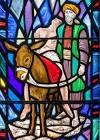
The lawyer who questioned Jesus about how to obtain eternal life would have been versed in Mosaic law. However his idea of neighbour was probably someone near or like him, in other words a fellow Jew. Jesus expanded his understanding of the word by telling the parable of the Good Samaritan.
Jews and Samaritans hated one another; indeed, Jesus and his disciples had previously been prevented from staying a Samaritan village because they were travelling to Jerusalem (Luke 9:51-56). Two of the disciples wanted to bring down fire from Heaven to punish them. It’s interesting in this context that Jesus made one of those people who had rejected him the hero of his story.
The Northern kingdom of Israel, whose capital was Samaria, had fallen to the Assyrians in the eighth century BC and its people were taken captive. Some returned and established their temple at Mount Gerizim. They also differed from the Jewish people about which scripture to accept. There was such enmity between the two groups that the Samaritans poured pigs' blood around the foundations of the temple in Jerusalem, which the Jews were trying to rebuild, so that it would be ritually defiled. In the second century BC the Jews destroyed the Samaritan temple at Gerizim.
The man who was assaulted and robbed was travelling from Jerusalem to Jericho, a distance of about eighteen miles. The winding road was notorious for ambushes, for there were plenty of places for bandits to hide and then escape into the desert. Travellers would have descended more than half a mile in elevation, for Jericho lies in the Dead Sea Valley. The terrain is rocky and the injured man would have been exposed to the full heat of the sun with no water. The Samaritan’s charity was practical and unselfish. He bandaged the wounds and poured oil and wine into them to prevent infection and promote healing. These commodities were not cheap. He would then have had to walk, as the man was being carried on his mount. There were inns along the route but he might have had to journey a fair distance. He gave the innkeeper two denarii (a day's wages). He could have left it that but he promised to return and if necessary reimburse him. The lawyer would have got the message. What the Samaritan had done for somebody he was supposed to hate was a very great act of kindness. It is indeed a challenge for us. It is all to easy to help friends and family in need but what about those we don’t like or more especially those who don’t like us?